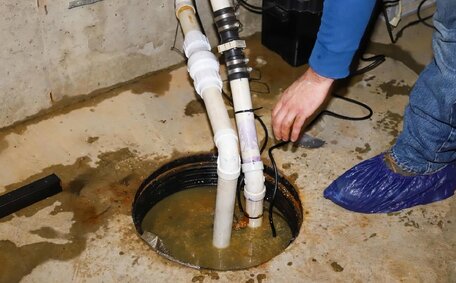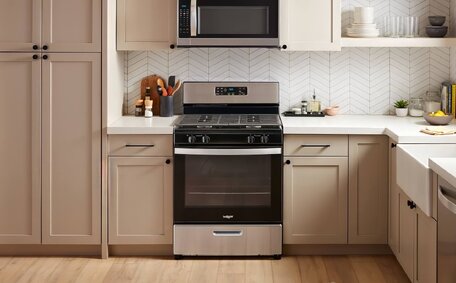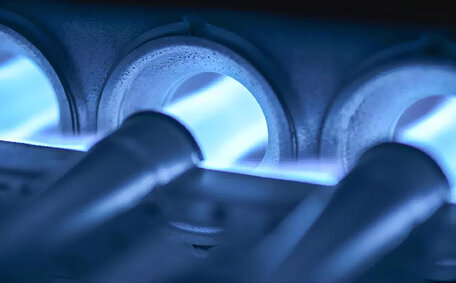Introduction to DIY Gas Fitting
In the realm of DIY projects any work you can undertake at your abode, especially those centered around gas fitting, it’s understandable to tackle some tasks solo as DIY work can save money and fit within your budget. However, determining what can be safely attempted in DIY gas system repairs might seem like a way to achieve savings with DIY efforts, requiring a licensed plumber’s expertise due to the specialised knowledge and care needed for serious safety risks.
Our plumbing guide delves into tips and tricks for DIY solutions that projects can benefit from, like working with gas pipes and ensuring the safety of your system, emphasising the crucial role of a licenced professional.
We’ll offer an overview of standard residential gas fittings components because grasping the basics of your plumbing system is crucial for your home improvements. We’ll also discuss warning signs that you might run into some troubling scenarios during your home improvement ventures.
Our goal is to enlighten homeowners about safety considerations, and it’s important to weigh the complexities of gas fitting work, ensuring you consider DIY attempts against the wisdom of engaging a fully licensed gas fitter.
Evaluating Your Skills and Project Complexity
When it comes to need get hands-on with considering pipe fitting projects for DIY gas fitting, it’s crucial to keep in mind your existing skills in plumbing work against the complexity of the task at hand. attempting to engage in gas work that’s illegal do can risk serious consequences like gas leaks, explosions, carbon monoxide poisoning, or even legal penalties.
As a general guideline, activities like changing a valve washer or switching taps are more than basic DIY plumbing tasks; they can help you learn the essentials. However, when it comes to plumbing tasks such as attempting to connect gas pipe fittings with female pipe threads, which can be complex with regulators and appliances, demand strict safety measures and usually require the expertise of professional plumbers who are licensed gas fitters.
To assess if your experience aligns, consider whether you can identify proficiency in areas like pipe fitting that mirrors the work professionals accomplish in your tasks:
- Do I thoroughly understand gas terminology, codes and standards?
- Am I correctly certified and insured to work on gas systems?
- Do I own technical equipment like pressure gauges and pipe threading tools?
- Can I precisely assess the water pressure, gas type, line sizing, venting necessities, and the like?
- Am I prepared to take safety precautions like leak checks?
If the response is no to any of those queries, when it comes to plumbing repairs, you might find that you lack the specialised skills to safely carry out your DIY efforts. Legal repercussions are often a consequence if you’re unable to can handle the complexity of illegal DIY gas work beyond basic plumbing projects.
keep in mind if any work professionals could better handle your DIY plumbing project that involves extensive alterations like relocating an appliance or integrating new gas outlets. Altering the existing gas supply infrastructure heightens complexity and safety risks. In these instances, you should call professional plumbers who can handle the job with expertise.
Maintaining realism about the pros and cons of DIY plumbing, including the potential drawbacks and risks of such endeavors, against your capabilities can be illuminating but also helps avert potential catastrophes. when comes to any uncertainty, it is judicious to call professional plumber help by reaching out to work with professionals who are fully certified gas fitters.
Gathering the Right Tools and Materials
Undertaking as much possible work in DIY gas fitting without the recommended tools and equipment, which is probably not what you want to do and may necessitate intervention by a licensed professional. Key tools include:
- Pipe wrenches
- Hacksaw
- Pipe cutters
- Flaring tools
- Gasrated Teflon tape (not standard plumbing tape)
- Spanners
- Pressure gauge
- Leak detection fluid
- Flashlight
Note that knowing when to use correct fittings safe for gas along with tape gas-rated Teflon, as opposed to just any tape, is essential for keeping connections secure and sealing threaded joints. In contrast, tape designed for gas can actually prevent dangerous blockages.
The importance of top-notch materials is paramount, whether you choose to do yourself the pipe installations or hire a professional, inclusive of correctly sized copper pipes, correct fittings, and flanges. Poor quality parts risk water damage due to leaks.
If lacking the pipe connectors and tools you can buy and use easily, the complexity of the plumbing gas fitting project likely exceeds DIY capabilities. Tools that you could also utilise make a key difference in some cases, getting the job done safely or deciding on a project that’s too risky, with peace of mind. We recommend consulting a licenced professional instead when equipment constraints restrict what you can do.
Understanding Permit and Code Requirements
When you’re working gas fitting in a DIY capacity, make sure to check your local state council’s requirements concerning permits, codes and standards. Failing to obtain necessary approvals or follow regulations are examples of steps you shouldn’t do, as such oversights can risk serious fines or safety issues.
In Paddington, gas work generally requires council permits beyond basic improvement projects. All residential gas installations must comply with Australian Standard AS/NZS 5601.1 as the primary safety code. Some key areas covered involve:
- Gas pipe sizing and routing
- Ventilation specifications
- Flueing standards
- Location rules for your water heater system and other related appliances
- Testing procedures
It’s important to note that major your renovation projects involving plumbing and gas in Paddington usually need approved development applications. Be sure to contact the council early in your plumbing repair planning to determine if DA submissions will be expected.
Ensuring you select appropriate pipe fittings for your project requires effort upfront, but prevents legal problems down the track. It also gives you access to council advice for building safely to code. Refrain from sanctioning unapproved modifications that could put your property and its inhabitants in jeopardy.
Using Proper Safety Procedures
When it comes to electrical plumbing work, one should always ensure strict safety procedures are absolutely critical. Gas systems involve extremely flammable and hazardous substances under high pressure, so mistakes can cause severe consequences like explosions, fires, poisoning or death.
Keep in mind, some key precautions include managing your hot water system safely:
- Ensuring vigilance to turn off water supply and used gas at the mains prior to commencing any task
- Using PPE like goggles and gloves suitable for those who use gas
- Conducting initial and ongoing leak checks with detection fluid
- Having an appropriate fire extinguisher on hand
- Working in a well-ventilated area away from ignition sources
- Following gas appliance manufacturer instructions precisely
- Carefully resealing all openings made into gas infrastructure
Failing to take even minor safeguards can end up leading you to face disastrous outcomes. Recall that home electrical fires always get attention since they amount to over 50,000 incidents annually in Australia, with some resulting from wiring mishaps. Gas leaks and related plumbing issues present comparably grave perils if due diligence isn’t carried out.
If you have any doubts about safely managing key precautions, the project scope around house likely exceeds DIY capabilities. No shortcuts can be taken with gas work. Consider consulting a licenced professional when unsure about hazard control while working with gas.
Potential DIY Gas Fitting Projects
When carefully evaluated, some diy tasks like two 90-degree gas fitting jobs are potentially manageable by an experienced homeowner. Two examples include:
- Undertaking your own plumbing work by installing gas appliances using established, straightforward links suitable for all kinds of pipe and outlet connections
- Replacing a gas stove in your kitchen or a dryer with a comparable model requiring no line alterations
Keep in mind that even what appears to be straightforward projects, like connecting a gas line, necessitate comprehensive safety measures, preparation, and meticulous planning when it comes to plumbing, and proper execution. Attempting gas work is not just about having a lot fun; it’s a serious matter to consider before disregarding the need for proper qualifications, given the risk of fatal consequences.
Several factors must determine if plumbing jobs are ones you can DIY:
- The appliance, such as an irrigation lawn watering system, connects to existing lines with no modifications
- No gas or ventilation code violations result
- The equipment and fixtures are legally approved products
- Detailed manufacturer instructions are available
- All necessary tools and materials are accessible
- Safety protocols can be strictly followed
There no room for doubt; when approaching any grey areas in these criteria, there is no substitute for consulting a licenced professional. The intricacies of gas systems make even basic jobs potentially hazardous for amateurs. Never compromise safety - if doubting your skills, call a licenced gas fitter.
When to Call a Professional Plumber
It becomes imperative to contact a licenced, insured plumber instead of embarking on a DIY project when faced with scenarios like:
- Installing a rainwater tank or new gas lines for appliances lacking existing connections
- Modifying, extending or relocating current gas infrastructure
- Working within close proximity of electrical work, sewage or other hazardous conditions
- Lacking the proper tools, materials, skills or safety equipment
- Needing to meet specific building codes or approval requirements
No matter the intent, illegal DIY gas work can necessitate having a plumber do the job due to the risk of injuries, fires, carbon monoxide poisoning, voided insurance claims, and legal prosecutions with severe fines. Only trained professionals have the expertise to safely handle complex aspects like:
- Sizing pipes correctly
- Balancing gas flows and pressure
- Conducting stringent leak checks
- Ensuring adequate ventilation
- Using specialised equipment
For reliable, legal and safe gas fitting services in the Paddington area, contact our licenced team at Paddington Plumbing on 1300 349 338 or [email protected]. Get qualified assistance tailored to your specific project’s installation codes and safety needs.
Finding a Reputable Plumber
When hiring a professional for any plumbing work that you can’t DIY, it’s vital to ensure they are properly qualified, experienced and insured. Avoid non-licenced handymen making dangerous claims about their abilities. Key signs of a reputable plumber include:
- Full plumbing licences for your state or territory
- Extensive gas fitting credentials and training
- Current public liability insurance certificates
- Strong reviews and local name recognition
- Personable staff who answer questions transparently
In the Paddington area, Paddington Plumbing meets all credentials for legal, safe gas servicing. With 20+ years serving Sydney, we undergo regular industry training to remain current on methods and codes.
Before any home gas project, verify vendors’ licences and policies. Reputability checks avoid rogue operators risking disaster through unsafe DIY-level work. For professional assistance meeting all Australian standards, contact our team today on 1300 349 338.
Questions to Ask Before Hiring
Thoroughly vetting potential plumbing professionals is vital before they work on gas or water lines in your house. Key questions homeowners should ask prospective plumbers include:
- Are you fully licenced and insured for residential gas work in my state/territory?
- Can I please see current copies of your gas fitting licence and insurance certificates?
- How much experience do you have specifically with projects like mine?
- Will you provide a detailed quote upfront listing all charges?
- What is your timeline estimation for completing the job?
- What safety procedures and precautions will you implement?
- Do you foresee any potential compliance issues or need for council permits?
- Can you offer references from past residential clients with similar gas fitting needs?
Verifying credentials, capabilities and approach helps determine reputability. Those unwilling to openly answer licencing, process and pricing questions may indicate dubious qualifications. Verifying credentials, capabilities and approach helps determine reputability. Those unwilling to openly answer licencing, process and pricing questions may indicate dubious qualifications.






